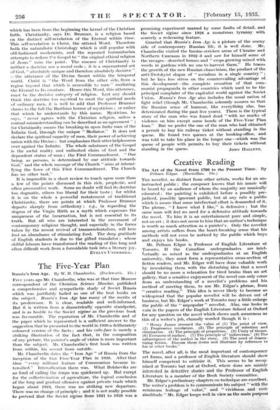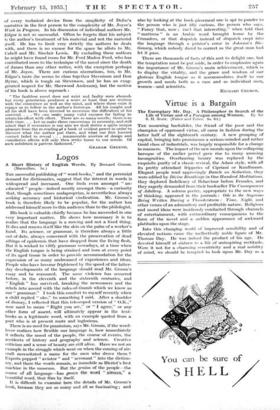Creative Reading
The Art of the Novel from 1700 to the Present Time. By THE novelist, as distinct from other artists, works for an un- instructed public ; the composer knows that his music will be heard by an audience of whom the majority are musically educated ; the painting is exhibited before a possibly pre- judiced, possibly ignorant public, but at any rate a public which is aware that some intellectual effort is demanded of it. The phrase, "I know what I like," is defensive ; but the same man will feel no need for a defensive attitude towards the novel. To him it is an entertainment pure and simple, not an art ; it does not occur to him that an author's technique is worth as much attention as a painter's. Only the novelist among artists suffers from the heart-breaking sense that his methods will not even be noticed by the public which buys and enjoys his books.
Mr. Pelham Edgar is Professor of English Literature at Toronto. If the Canadian undergraduates are intel- lectually as mixed as the' undergraduates at an English university, they must form a representative cross-section of fiction readers, and Mr. Edgar will have done valuable work by inoculating them with the disturbing idea that a novel should be no more a relaxation for tired brains than an art gallery, that a sensitive enjoyment of the novel can only come from an understanding of a novelist's problems and his method of meeting them, to use Mr. Edgar's phrase, from "creative reading." This idea is never likely to become so widespread that the popular novelist will be driven out of business, but Mr. Edgar's work at Toronto may a little enlarge the public of the " unpopular " novelist. Alas, one looks in vain in the papers of the English Literature School at Oxford for any question On the novel which shows such awareness as this of a writer's job, clumsily worded though it is :
"Henry James stressed "the value of (1) The point of view. (2) Progressive revelation. (3) The principle of selection and elimination. , (4) The principle of proportion. (5) Unity of theme. (6) Evenness of surface. (7) The principle of indirection.' (8) The submergence of the author in the story. (9) The need of drama- tizing fiction. Discuss these items and illustrate by reference to his or other books."
The novel, after all, is the most important of contemporary art forms, and a professor of English literature should show himself competent to criticize it. This seems to be recog- nized at Toronto but not at Oxford, where dons are Mainly
interested .in detective stories- and the Professor of English
Literature is a member of the Book Society committee.
Mr. Edgar's preliminary chapters on technique are excellent. The writer's problem is to communicate his subject" with the minimum leakage of value," and "vividness and veri- similitude " Mr. Edgar keeps well in view as the main purpose
of every technical device from the simplicity of Defoe's narrative in the first person to the 'complexity of Mr. Joyce's Work in Progress. In his discussion of individual authors Mr.
Edgar is not so successful. Often he forgets that his subject is the author's treatment of his material and not the material itself. He has to limit very strictly the authors he deals with, and there is no excuse for the space he allots to Mr. Cabell and Mr. Sinclair Lewis. By excluding these authors he might have found room for Mr. Ford Madox Ford, who has contributed more to the technique of the novel since the death of James than any other writer, with the exception perhaps of Mr. Joyce. There are curious aberrations, too, in Mr. Edgar's taste (he seems to class together Stevenson and Don Byrne, which is tough on Stevenson, and he has an exag- gerated respect for Mr. Sherwood Anderson), but the motive of his book is above reproach :
"The faultless novel does not exist and faulty ones abound, but every generation produces a score at least that are written with the conscience as well as the mind, and where these exist it repays us to follow in the author's footsteps. All his insight and all his skill have been directed to overcome the difficulties of his material. . . . We can make many valid excuses for failing to return his effort with effort. There are so many novels; there is so little time. . . Let us make these concessions to necessity, and still admit that if recreation is our aim we shall derive a quite unique pleasure from the re-reading of a book of evident power in order to discover what the author put there, and what our first hurried contact failed to reveal . . . innumerable niceties of design and cumulative effects will only then strike home to our minds. Of such subtleties is pattern fashioned." • GRAHABI GREENE.











































 Previous page
Previous page